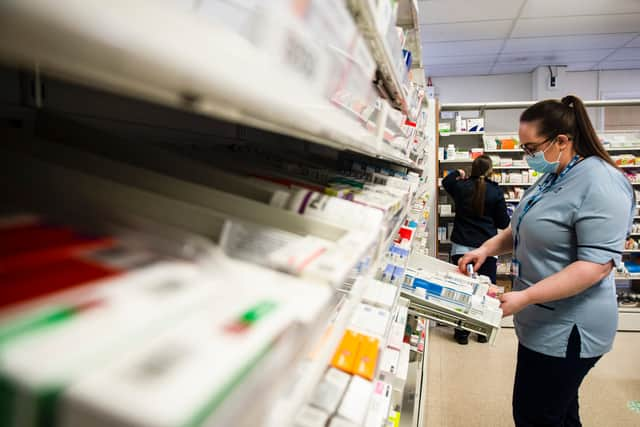Pharmacists in England to start treating 7 minor illnesses freeing up 10 million GP appointments every year
and live on Freeview channel 276
Pharmacist capabilities are being extended meaning fewer trips to the GP. From January 31, patients in England don't need to ring their doctors or get a prescription to get their hands on much needed medication for seven minor illnesses.
The NHS has said the Pharmacy First scheme aims to free up millions of GP appointments and brings England in line with similar schemes already running in Scotland and Wales.
Advertisement
Hide AdAdvertisement
Hide AdDeputy superintendent pharmacist at Boots, Aimi Dickinson, said: “It enables patients in England to access advice, and also treatment where appropriate, including some prescription only medication for seven common conditions from our pharmacies, and that's without the need for an appointment or a prescription from the GP. This type of service is available in Scotland and Wales already so it's something that we certainly welcome and I think it gives patients more choice and access on the high street to care when they need it.”
The conditions covered by the scheme include ailments affecting the ear, nose and throat. Pharmacist Bina Mehta said: “With Pharmacy First, pharmacists can provide advice and appropriate treatment for sinusitis, sore throat, earaches, infected insect bites, impetigo, shingles or an uncomplicated urinary tract infection in women.”
The service is free at the point of access. Patients will be charged for over the counter medicine but those who receive a prescription only medicine and are not eligible for free NHS prescriptions will be charged the standard NHS prescription levy. Pharmacists are highly trained and can already offer advice on symptoms and when to take medicines.


Superintendent pharmacist, Claire Nevinson, said: “Our pharmacists have undergone four years of a degree program at university and have also completed one-year in work training before they register and practice as a pharmacist.
Advertisement
Hide AdAdvertisement
Hide AdMs Dickinson agreed, saying: “We can utilise our skills, we’re the experts in medicines and treating some of these minor conditions, so it's a great opportunity for pharmacists to showcase what they can do and also support the wider NHS system and primary care.”
Pharmacy groups are widely welcoming the rule change but have raised some concerns over financial funding and a raft of recent chemist closures. However, analysis of NHS data last summer found 38 million patients waited over 14 days to see their doctor and it's hoped the scheme will help trim the backlog and allow GPs to focus on more complicated or serious cases.
The aim is to free up as many as 10 million doctor appointments. Ms Dickinson said: “So the ambition is actually by next winter that will be able to save up to 10 million GP appointments and that will ultimately mean that GPs can spend more time with patients that have maybe got some more complex needs rather than the minor conditions which can certainly sit in community pharmacy to be able to treat and advise on.”
GP Dr Sara Kayat was also positive about the changes. She said: “It frees up time for GPs like myself so that we can offer help to patients with different healthcare needs. It's an effective way of delivering primary care ensuring that our expertise are used in the right places.”
Speaking about whether the scheme could be rolled out further, Aimi added: “We'll see how these seven conditions go but I'm sure there will be scope for more in the future and we'd welcome that.”
Comment Guidelines
National World encourages reader discussion on our stories. User feedback, insights and back-and-forth exchanges add a rich layer of context to reporting. Please review our Community Guidelines before commenting.
